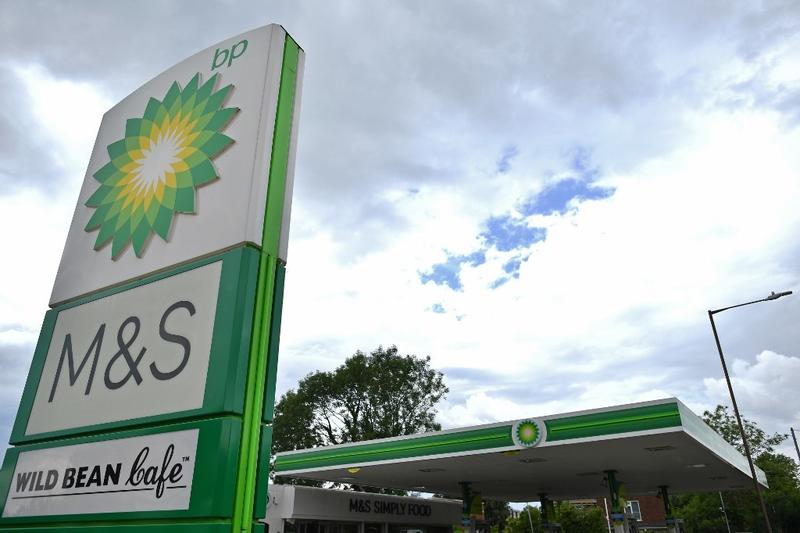 In this June 15, 2020 file photo, BP logos are seen at a M&S (Marks and Spencer) petrol and diesel filling station in Hildenborough, southeast of London. (BEN STANSALL / AFP)
In this June 15, 2020 file photo, BP logos are seen at a M&S (Marks and Spencer) petrol and diesel filling station in Hildenborough, southeast of London. (BEN STANSALL / AFP)
LONDON - Europe’s top oil companies are yet to be aligned with UN-backed targets to combat climate change even after outlining ambitious plans to slash carbon emissions and pivot to renewable energy, according to a report backed by a group of major investors.
No company was set to meet the United Nations-backed Paris Agreement’s long-term goal of limiting global warming to “well below” 2 degrees Celsius above pre-industrial levels by reducing carbon emissions to net zero, according to a report
The study by the Transition Pathway Initiative (TPI), which unites investors with US$22 trillion in holdings, comes as shares of European energy companies including BP and Royal Dutch Shell have struggled amid concerns over their ability to successfully shift away from oil and gas.
TPI's analysis of 59 major oil, gas and coal companies showed that seven European firms - Glencore, Anglo American, Shell, Repsol, Total, Eni and Equinor - have set out plans to align with long-term pledges made by some governments to cut greenhouse gas emissions.
But those targets equate to global temperatures rising by 3.2 degrees and are “widely regarded as insufficient to avert dangerous climate change,” reads the report published on Wednesday.
ALSO READ: EU pitches massive economic overhaul in new climate plan
No company was set to meet the United Nations-backed Paris Agreement’s long-term goal of limiting global warming to “well below” 2 degrees Celsius above pre-industrial levels by reducing carbon emissions to net zero, it reads.
“We’re very happy that some oil and gas companies are seeing these fundamental changes and trying to respond,” said Bill Hartnett, stewardship director of ESG Investment at Aberdeen Standard Investments, a TPI member.
“Some (companies) might have made bigger statements so far than the others and the important thing is the direction of travel. But none of them are making net zero yet,” Hartnett told Reuters.
BP, whose CEO Bernard Looney plans to grow the company’s renewables business twenty-fold by the end of the decade, is the least aligned among the European companies, not even meeting the government pledges level, according to the report.
ALSO READ: Daimler to pay US$2.2b in emissions cheating settlements
In May, BP said that it disagreed with TPI’s methodology which focuses on the carbon intensity of fuels.
Fossil fuels are the main cause for the release of heat-capturing greenhouse gas emissions.
Investors such as Aberdeen are regularly talking to companies about their Paris Agreement alignment on issues including emissions from fuels sold, known as Scope 3 emissions, and their memberships in energy associations around the world, Hartnett said.
“Engagement is ongoing and there is pretty good momentum on getting towards Paris alignment.”
READ MORE: End of combustion engine moves closer with EU climate plan
A Shell spokeswoman said the company continues “to engage with TPI over their methodology” to show it how it is aligned with “society’s move towards” the Paris goals.
Anglo American said in a statement: “achieving these targets is not all within our control, so we are working with governments, industry peers and civil society... to support the development of effective and efficient policies to combat climate change.”
Repsol said: “We will continue to engage with TPI to demonstrate our progress in this respect.”


